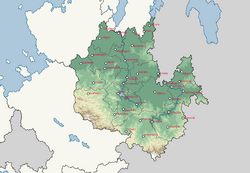Krumlau
Federation of Krumlau Krumlawische Föderation / Крумловская Федерация | |
|---|---|
| Motto: Tod vor Schande Death before dishonor | |
 Map of Krumlau | |
| Capital and largest city | Rakonitz |
| Official languages | Hesurian, Wenish |
| Demonym(s) | Krumlavian |
| Government | Federal parliamentary republic |
• Präsident | Albrecht von Thalmark |
• Kanzler | Kristine Wojtek |
| Bundesrat | |
| Area | |
• | 1,004,344.2 km2 (387,779.5 sq mi) |
| Population | |
• 2015 census | 43.9 million |
• Density | 42.75/km2 (110.7/sq mi) |
| GDP (PPP) | 2018 estimate |
• Total | $1,925 trillion |
• Per capita | $44,831 |
| GDP (nominal) | 2018 estimate |
• Total | $1,627 trillion |
• Per capita | $37,911 |
| Gini (2015) | 33.2 medium |
| HDI (2015) | .904 very high |
| Currency | Krone (KRN) |
| Date format | dd.mm.yyyy |
| Driving side | right |
| ISO 3166 code | KR |
| Internet TLD | .kr |
The Federation of Krumlau, also known as Krumlov, is a country in southern Erdara bordered by Mascylla, Hytekia in the north, and Dulebia to the southwest. Krumlau is a landlocked country covering an area of 1,004,344 square kilometers, making it the largest nation in Erdara. It is a Federal parliamentary republic consisting of 14 highly autonomous constituent states and two free cities. The organization of the nation is complex and structured on regional and linguistic grounds, given the country's billingual nature. It's largest city and capital is Rakonitz, with 3.8 million residents. Other major cities include Vladika, Nordgau, Ihlen, Rühen, Kandau and Waasen.
Krumlau is home to two major ethnic groups, a Hesurian community, which comprises of 41% of the population, and a Pomric Wenish community, which form the majority of the populace with 47% of Krumlau identifying as Wenish. Additionally, certain regions of Krumlau are inhabited by Kuns, consisting of 6% of the population. Despite lacking majority, the Hesurian language is considered the Lingua Franca in the nation, although both the Standard Hesurian dialect and Wenish are taught at schools. The two free cities, Rakonitz and Vladika, are officially billingual, although Hesurian is the dominant language in the Capital, while in Vladika Wenish is dominant.
The Krumlavian state's formation begins in the 10th century, with the creation of the Order of the Haemator Knights of the Cathartic Temple, an order mainly composed of Hesurian followers of Ditanery with the goal of converting the Pomric peoples south of Erdara. Sponsored by the Ragucin Empire, the order, together with Hesurian local nobles, made significant gains in conquering northern Pomric pagan area. The Margraviate of Krumlau was founded in 1019, as a vassal to the Ragucin Emperor. Several of the conquered lands were also granted to the Haemator Order, who undertook significant conversion efforts of the local Pomric folk. The Margraviate grew in influence and size, receiving major imperial support during invasions from eastern hordes. As the Ragucin Empire splintered in the late 15th century, the surroundings of the Margraviate and the now decadent Haemator Knights banded in a loose confederation, creating the Kingdom of Krumlau. In the early 19th century the unstable order of this Kingdom reached its peak in the Krumlavian Revolution, which would eventually form the Republic of Krumlau. The nation grew as an industrial powerhouse and has since then emerged in Erdaran affairs.
The aftermath of the Revolution was defined by increasing animosity between the Hesurian and Wenish peoples, with significant separatist movements present during the second half of the 19th century. The economic differences between the industrial, Hesurian north of the nation and the more rural Wenish south created a sour political environment, which shaped the political organization of the country to this day. It was only during the Continental War and posteriorly at the (Maybe a Krumlavian-Dulebian war?) that a true shared Krumlavian identity was created. Despite this, separatism and regionalist politics have remained, albeit at a weaker state.
Krumlau is one of the founding states of the Erdaran Union and the Assembly of Nations, partaking in various multilateral efforts particularly when it comes to the further economic and political integration of Erdara.
Krumlau is a highly developed nation, with an advanced high-income economy. It has very high standards of living, quality of life, education and healthcare, yet regional disparities in development are still noticeable.
